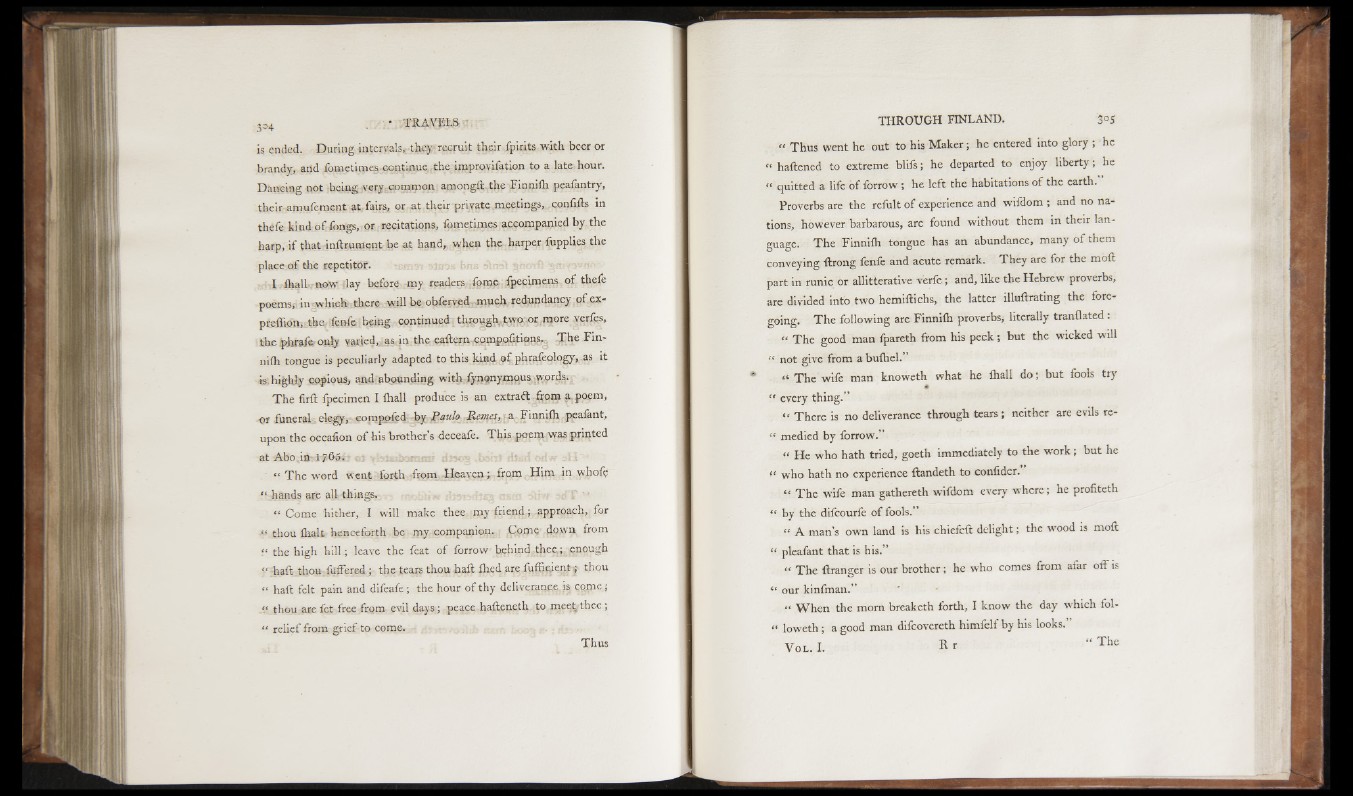
is ended. During intervals* they-recruit their ipirits .with beer or
brandy, and fometimes-contbme,the irpprovifation to a late hour.
Dancing not being very common amongft. the Finniih peaiantry,
their amufement at fairs, or at their private meetings, confifts in
thefe kind o f Fongs, or recitations, fbmetim.es accompanied by the
harp, if that-inftrument be at hand, when the harper iupplies the
place o f the repetitor.
I . ihall now ¡lay before my readers fomc fpccimcns o f theie
poems, 1 in twhich there will be obferved . much redundancy o f ex-
preflion, the,¡fenfe being continued tbrough.two ormore yerfes,
the pfrrafe only varied, as in the eaftermcpmpofttiQlis. T he Fin-
nifh tongue is peculiarly adapted to this kind of phraseology, as it
is: highly copious, and abounding with iynonympus words.
The firft fpecimen I ihall produce is an extract fi;am a poem,
or funeral.; e le^ v eompofeft -by Paulo. ,Reme^t [a.; Finniih peafimt,
upon the occafion o f his brother s deceaie. This-.poem was printed
at Abo in Xf&o. • <
' “ The word went forth from Heaven;,from Him in whole
“ hands are alt things,
“ Come hither, I will make theeg my ftiepff;,-approach,, for
“ thou lhalt henceforth be my,¡companion*. I p.Pfl3? (ipWA from
the high h ill; leave the feat o f forrow' hehind.theej;, gnqvigh
“ haft thou fuffered; the tears thou haft ihed, are fuffisyent j thou
“ haft felt pain and difeafe; the hour o f thy deliverance. cpme,;
“ thou are fet free from evil days; peace hafteneth to mee.b thee;
“ relief from grief to come.
Thus
“ Thus went he out to his Maker; he entered into glory ; he
“ haftened to extreme blifs; he departed to enjoy liberty; he
“ quitted a life o f forrow; he left the habitations o f the earth.
Proverbs are the refult o f experience and wifdom ; and no nations,
however barbarous, are found without them in their language.
T he Finniih tongue has an abundance, many o f them
conveying ftrong fenfe and acute remark. They are for the moft
part in runic or allitterative verfe; and, like the Hebrew proverbs,
are divided into two hemiftichs, the latter illuftrating the foregoing.
T he following are Finniih proverbs, literally tranilated:
“ The good man ipareth from his p e ck ; but the wicked will
“ not give from abuihel.”
(t wile man knoweth what he ihall do;- but ibols try
" every thing.”
“ There is no deliverance through tears ; neither are evils re-
“ medied by forrow.”
“ He who hath tried, goeth immediately to the w o rk ; but he
f< who hath no experience ftandeth to confider.
“ T h e wile man gathereth wifdom every where; he profiteth
“ by the difcourfe o f fools.”
“ A man’s own land is his chiefeft delight; the wood is moft
“ pleafant that is his.”
“ T he ftranger is our brother; he who comes from afar off is
p our kinfman.”
“ When the morn breaketh forth, I know the day which fol-
“ loweth; a good man difcovereth himfelf by his looks.”
V o l . I. R r “ The